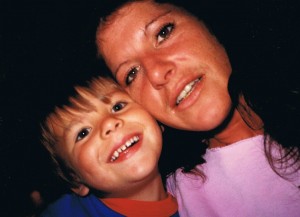Smoke
Lenny was never much on details, so he neglected to ask the contents of the tincture he imbibed. Upon his release, as he stumbled through the Folsom gates he recalled seeing what years later in Haight-Ashbury would be called chem trails.
He paid little attention, intent on expelling two years of pent-up frustration on his long-suffering wife, Sissy. Whatever drugs he’d been given came along for the ride and something was passed to his firstborn and only son, Mort.
Very early in his life, Mort began seeing things that weren’t there. Generally the visions came to him in the form of smoke. He saw a haze invisible to others. The black mirage would twist and dance in the air like ink poured into water. Mort could watch the show for hours, and sometimes his mother would find him with a far-off look that seemed to focus on everything and nothing all at once.
The toughening of Mort began early. The more he was beaten, the angrier he became. He was a hellion with everyone except his mother. To the rest, he was a malevolent force of nature, just like his dad. That worked fine on the playground because he was bigger and tougher than all the other kids. No one ever made fun of his club foot more than once.
He grew tall and lanky with shoulder-length hair and knuckles perpetually scuffed from work or fights. Mort was in his late teens when he rolled in to watch the 49ers game at the 81-Z where his mother worked. He should have been in school, but he’d been kicked out. He was too young to drink but that had never stopped him before.
“What’ll ya have?” asked Sissy with a tender smile.
“Anchor Steam,” Mort replied. Sissy winked and lifted the selection from behind the bar. She’d had it ready. Mort kept one eye on the smeary screen and the other on Sissy as she strolled away to the other customers. There was a drunk sailor down at the end who was watching Sissy with more intensity than Mort cared to allow. The screen above crackled as the announcers began to spout their endless verbal refuse. “They should play these games without narration,” Mort mumbled. “All I want to hear is the sound of helmets crashing and cries of impact. I can’t take the false poetry of these TV punks.” Nobody answered. That meant nothing to Mort; he was used to talking to himself.
He glanced to the end of the bar just in time to see the sailor slap Sissy on the behind. Sissy jumped as if stung and the sailor flashed her a lecherous smile. Mort made sure to look away before Sissy glanced in his direction. He wanted to allow her the dignity of pretending it had never happened, but he clenched his jaw so tight his teeth hurt. He took a flavorless swig of his Anchor Steam and tried hard to keep his hand from trembling. Over the course of years, Mort had lost all tolerance for any sort of physical aggression against his mother. Mort’s old man, Lenny, was never slow to raise his hand against either mother or child. Mort’s early attempts to defend Sissy were successful only in drawing attention onto himself. After those beatings, Lenny would usually take off to this very bar. In those moments, Sissy would hold Mort close and try to quench the fire inside him. Rinse, dry, repeat. Comfort was harder to come by when Mort reached puberty and became too big to cuddle. Sometimes Mort feared his rage was so insatiable that he might take it out on his mother, so he took to leaving the house...
Riding with the Angels brought a sense of purpose for a while, but it didn’t last. Around the fringes, Mort always had a vision of the smoke. With time, the dancing ink became clearer, more sinister, and impossible to escape. He could see faces, he could see acts. Mort came to understand that Lenny was pure evil. Sissy was not. Mort suffered an unbearable tension caused by enjoying his father’s gift of bullying and hurting on the one hand, and nursing a love for his mother that went so deep that when he thought about it, emotion welled up inside him as if he were going to throw up. He took his inner conflict on long strolls down by the dock and tried to let it out in low, haunting whistles. Most men were bad. The smoke showed him that. Striking first became self-defense when you had premonitions of what was to come. They all had it coming, and would respond tenfold if given the chance.
~~~
I felt it was important that potential readers know up front that this fantasy/ scifi novel was based upon "true events" with "possible" results... Having the book pop up at Reviewers Roundup was a challenge to read that I'm glad I responded to...
This is an extraordinary story. In many ways... For instance, Operation Paperclip was exposed as true in 1915...Scientists had brought over Nazi German scientists after the war, given other names and provided safety as they moved into society. We also know that tests were being made of the effects of LSD on people... This story is based upon those events.
At the same time, paranormal abilities of children, or results of earlier tests on people, were being watched...
I considered the character Mort LeFrance as, perhaps, the most important character. He was the result of a double-whammy. His father was a victim of tests as a prisoner, with subsequent results given to his son... Later, without being aware of what he was doing, He drank a pitcher of lemonade, not knowing it was laced with LSD... Although the researchers feared he would soon be dead, he lived...
Mort LeFrance was given a gift of smoke, which allowed him to decide who was good and evil... Most were evil in his eyes... They died...
His mother had been the only person he loved and who loved him. She died...Somebody had to pay...
During his search, he discovered a young girl who also had powers...
There was strength in how she stood defiant, but not enough to disguise her inherent vulnerability. The young girl wore a white spring dress with green embroidery over the heart and a blue ribbon in her hair. Twelve years old, she still had the elfin-like build of a small child. Throughout her neighborhood she was known to be polite and kind. An air of joy surrounded her and her presence brightened any gathering. Strangers felt a pull to assist her in moments of distress. Unfortunately, at that moment, the street was empty save for one dark figure and his creature.
Before her stood a snarling beast. The animal was a savage German Shepherd, with feral muscles rippling under greasy hair. Time slowed for the girl as the beast focused its considerable blood lust upon her. The dog’s ears peeled back, its hackles raised. Ridges formed in its face, and teeth flashed beneath curled lips. Worst of all, its eyes shone like lasers; bloodshot red, they bored deep into the girl’s soul and reflected no hint of mercy or compassion. Next to the dog the stranger stood with long hair protruding from beneath a black Stetson hat like strands of a soiled mop. A self-satisfied smirk was plastered across his face and he seemed to draw pleasure from beholding the girl’s terror. He waited, neither commanding the dog to attack nor to heel; savoring the moment, fixated on the girl’s terrified trembles. The cowboy stood over six feet tall, thin with hard muscle.
Darkness emanated from him. The girl could sense something beyond the lurking rot of a corrupt adult. She often saw things others could not, things that existed on a plain of reality between sleep and consciousness. Through the filter of her special vision, midnight smoke billowed from the sockets of the cowboy’s eyes.
~~~
Mort had found the location of the family involved with his mother's death. They all would pay. He'd moved into the neighborhood to plan and had met the daughter, Carlie. She was afraid of Mort and his dog, but she also was able to see the smoke coming from the cowboy's eyes... Her abilities were not yet developed but she realized who he was and what he could do...
Mort chose the night and did the work to ensure the entire family burned, but with Carlie's awareness, she was able to get out of the first floor bedroom she had, while her family were trapped on the second floor. She knew who had done this, but had no way to prove it. But she knew they would meet again...
Mickey was just 10 years old at the time. He enjoyed showing how he was able to predict coin tosses with an older friend...After he had shown his special skills, Curly advised him to not be so willing to let people know what he could do.... Even then as Curly spoke, Mickey had chills run down his spine as he sensed what his friend was trying to tell him. He stopped trying to share his predictions with his parents or anybody, but he kept a notebook of all that he was able to know in advance...
But nothing explained to him how and who had written in his notebook to be aware of the Cowboy... Mort...
Dan Woll had written this book years earlier and had decided to try to finish it by asking Walter Rhein to consider whether it could be made into a co-authored novel. Obviously, they were successful and is presented to readers as an edgy, strange, and scary story about how, potentially, scientific tests have resulted in terrible changes to humans... Whether this is a plausible story, we don't know, but, just the awareness of what occurred in the past, related to drug trials with LSD and more, provides an awareness of the reality of what has or could have happened in our lives, especially to those in jails or in military service...
How the story moves forward and ends is fascinating... Can the power of good succeed through the paranormal experience? The book is thought-provoking, imaginative and exciting to consider as we read... It's not exactly an easy book to read, especially about Mort, who is both the victim and the villain. I found his backstory made a memorable statement about physical abuse in the family. On the other hand, the two children who had gifts, some of which neither had yet known about it, until they "happened" was fun to watch. I enjoyed the book and recommend it highly for your consideration...
GABixlerReviews
MYSTERY MEN. Local writers Walter Rhein, left, and Dan Woll collaborated on Paperclip, a thriller inspired by real-life weirdness, including MKUltra.
























